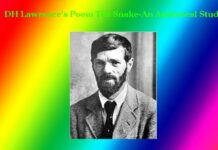Shakespeare | Sonnet 154 | An Analytical Study
Shakespeare | Sonnet 154 | An Analytical Study
Shakespeare | Sonnet 154 | An Analytical Study
‘Sonnet 154’ by William Shakespeare is the last sonnet of his sonnet sequence. Like most of his sonnets, this sonnet also deals with the theme of love. In this sonnet, the poet William Shakespeare has expressed the philosophy of love that it is a passion that can never be swept away from the human heart. It is instinctive. First, the poet gives an imaginative (poetic) account of how the passion of love enters the heart of a man, and then he expresses his philosophy of love.
The poet gives a poetic description of the birth of the passion for love and says that the passion of love was first in Cupid, the god of love. Once he was lying asleep keeping his brand (stick) of the passion of love beside him. In the meantime, some maidens (nymphs) who had taken a vow of chastity happened to pass by. Then the most beautiful (fairest) nymph picked up the brand which was full of the burning flame of love. When she picked up the brand of love in her hand it had given rise to the passion for love in the heart of numerous people. Thus Cupid lost his brand of love and its passion was transferred to the heart of humans. Being hot by the flame of that love brand, the nymph dipped it into spring full of cool water. The water of the spring became hot being in touch with the hot brand of love and thus the spring became hot for ever. From then onwards the spring acquired the power to remedy any disease of humans. The poet also became ill of love and hence he went to the spring to get a remedy for love-sick. But instead of getting a remedy the poet’s desire for love for his mistress increased and then it was proved by the poet that the passion for love is so hot that no water could cool it. The poet says:
“Love’s fire heats water, water cools not love”
The cause of the passion of love and its creeping down into the human heart as shown by the poet is highly fantastic, which falls in the genre of literary conceit. And it is the conceit that has added charm to this sonnet.
Moreover, the sonnet reveals the poet’s intimate love and true affection to his mistress. Hence, like preceding sonnets of his, this sonnet is also autobiographical which reflects his passion for love for his mistress i.e. dark lady.
This sonnet is written in the rhyme scheme of ab ab, cd cd, ef ef, gg, which is popularly called the Shakespearean rhyme scheme or English rhyme scheme. There are some unfamiliar but poetic phrases as— “the little love-god” which indicates the Greek mythological god Cupid, who is a mere boy that presides over the passion of love; “the heart-inflaming brand” which means the stick full of the passion of love; “came tripping by” means came dancing with a mirthful heart; ‘Votary’ which means a flower of Diana, who is the goddess of hunting and chastity, ‘legions’ means large numbers, ‘the general of hot desire’ indicates ‘Cupid’ the god of love, according to Greek mythology, who gives rise to the passion of love in human heart, “the virgin had disarmed’’ means the love inflaming brand of Cupid. The last line of this sonnet is so much significant and may often be quoted to show the profundity of the passion of love. 0 0 0
Shakespeare | Sonnet 154 | An Analytical Study
Read More: W. Wordsworth’s Poem ‘To the Skylark’: An Analytical Study
N. B. This article entitled ‘Shakespeare | Sonnet 154 | An Analytical Study’ originally belongs to the book ‘World Poetry Criticism‘ by Menonim Menonimus. Shakespeare | Sonnet 154 | An Analytical Study
Books of Literary Criticism by M. Menonimus:
- World Short Story Criticism
- World Poetry Criticism
- World Drama Criticism
- World Novel Criticism
- World Essay Criticism
- Indian English Poetry Criticism
- Indian English Poets and Poetry Chief Features
- Emily Dickinson’s Poetry-A Thematic Study
- Walt Whitman’s Poetry-A Thematic Study
- Critical Essays on English Poetry
- Tawfiq al-Hakim’s Novel: Return of the Spirit-An Analytical Study
- Tawfiq al-Hakim’s Novel: ‘Yawmiyyat Naib Fil Arayaf’-An Analytical Study
- Analytical Studies of Some Arabic Short Stories
- A Brief History of Arabic Literature: Pre-Islamic Period …
Related Searches:











